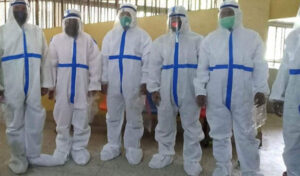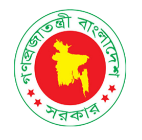 Bangladesh went into its official shut down for COIVD-19 pandemic management on 26th March 2020. (Dhaka Tribune) and it has been extended until 16th of May (Corona Info) . As of today (5th May), the total COVID-19 positive patient is 10, 929 (Corona Info) , which also had the highest positive cases of 786 within 24 hours. Doctors and healthcare providers are deemed as heroes who are working day and night to manage the COVID-19 positive patients, risking their own lives for the possible contraction of the infection. Among all the healthcare providers, the sample collectors play a major role in this pandemic management; the earlier the detection takes place, the sooner the preventive measures can be taken, and the better prevention for rest of the community people are in order.
To delve deeper into the experience of sample collectors, we spoke to a Community Healthcare Provider (CHCP) who is also working as a sample collector in Habiganj:
One day in early April, there was a notice regarding a call for volunteers from the sub-district hospital to work as sample collectors. Two CHCPs in Habiganj volunteered for this particular role, which is rather a risky job to provide care for the people in their area. In the first week, they collectively gathered around 150 samples from suspected patients in their community. Needless to say, this isn’t an easy job. They are working their hardest with available resources. Both of them received one training on sample collection techniques, use of sample collection kits, how to wear and take off Personal Protective Equipment (PPE) and discarding used materials from the respective Upazila Health and Family Planning Office (UHFPO).
The rest was history for them: they start their day from 8 am and it ends around 4-5 PM every day. They wake up in the morning at their dedicated campus residence and wear PPE, mask, gloves, goggles, face protection shields and show up to the office of UHFPO. They are given a list of households for sample collection and areas with suspected patients’ contact by the UHFPO or THO. They spray their motorbikes with disinfectant liquid and off they go to the villages.
Each sample collector is given a set of PPE: 1 bodysuit, 6 surgical masks and 3 pairs of gloves. After collecting the sample from an area, they dispose their used gloves and masks, sanitize their hands or wash with soap where water is available and wear a fresh set of mask and gloves, disinfect their bikes and set off to the next place to collect the samples. The sample collectors collect sample until 2 PM, then they return to the hospital, prepare the samples to be taken to the testing facilities, upload patient information in CMED app (GoB app for uploading suspected or Covid-19 infected patient information), write their daily report for the hospital authority and call it a day by 4-5 PM. Afterwards, they return to their residence provided by the Government of Bangladesh (GoB). Their food and transport (bike) are also sponsored by GoB. The samples are then taken to the district central hospital and later to the divisional central testing facilities for which it takes about 3-4 days to receive the results. Their phone numbers are provided to the police and Upazila Parishad, sometimes to the community clinic rural area patients as well, hence they receive phone calls until late at night regarding health consultation from the community people. Their work hours although officially finishes at 5 PM (for Ramadan 3:30 PM) but still they keep on working for the care of people beyond these hours.
Upon asking about the challenges they face in the field, they shared that it is sometimes difficult to convince the suspected patients to provide sample. They fear that their blood will be drawn and it will make a scene in the community, making them look sicker than they are. They try to convince the people by explaining that only swabs will be taken. Sometimes it works and sometimes they have to take help from the elected community members or police to convince the suspected patients to have their samples taken.
Another challenge is posed by the waiting time to receive the sample result. During this time, the community people stigmatize the person who provided the sample. Four patients tested positive in the first week, which later sprouted unrest in those communities when they visited the area again. They have to constantly counsel the community about not to stigmatize the people who provided sample or any COVID-19-positive patients as they are there to help them out with this infectious disease.
These healthcare providers are self-motivated. The courage they have in their hearts is unimaginable. They keep their motivation up by thinking they are the saviors of humankind in this kind of crisis. One of the CHCP’s father was a freedom fighter in the 1971’s liberation war of Bangladesh. He considers himself serving the people of his community as the son of the freedom fighter, who loved his country very much and risked everything to free it. He shared with us, “If we fear death, we won’t be able to work. The frontline healthcare providers are fighting this pandemic with all their might. No one should withdraw from their duties in this crisis. Our work stems from our sense of responsibility that we have toward our people because of our skills. I will take care of my people as long as I live.”
Written by Sairana Ahsan, Reporting and Documentation Manager of SHOUHARDO III, CARE Bangladesh.
Bangladesh went into its official shut down for COIVD-19 pandemic management on 26th March 2020. (Dhaka Tribune) and it has been extended until 16th of May (Corona Info) . As of today (5th May), the total COVID-19 positive patient is 10, 929 (Corona Info) , which also had the highest positive cases of 786 within 24 hours. Doctors and healthcare providers are deemed as heroes who are working day and night to manage the COVID-19 positive patients, risking their own lives for the possible contraction of the infection. Among all the healthcare providers, the sample collectors play a major role in this pandemic management; the earlier the detection takes place, the sooner the preventive measures can be taken, and the better prevention for rest of the community people are in order.
To delve deeper into the experience of sample collectors, we spoke to a Community Healthcare Provider (CHCP) who is also working as a sample collector in Habiganj:
One day in early April, there was a notice regarding a call for volunteers from the sub-district hospital to work as sample collectors. Two CHCPs in Habiganj volunteered for this particular role, which is rather a risky job to provide care for the people in their area. In the first week, they collectively gathered around 150 samples from suspected patients in their community. Needless to say, this isn’t an easy job. They are working their hardest with available resources. Both of them received one training on sample collection techniques, use of sample collection kits, how to wear and take off Personal Protective Equipment (PPE) and discarding used materials from the respective Upazila Health and Family Planning Office (UHFPO).
The rest was history for them: they start their day from 8 am and it ends around 4-5 PM every day. They wake up in the morning at their dedicated campus residence and wear PPE, mask, gloves, goggles, face protection shields and show up to the office of UHFPO. They are given a list of households for sample collection and areas with suspected patients’ contact by the UHFPO or THO. They spray their motorbikes with disinfectant liquid and off they go to the villages.
Each sample collector is given a set of PPE: 1 bodysuit, 6 surgical masks and 3 pairs of gloves. After collecting the sample from an area, they dispose their used gloves and masks, sanitize their hands or wash with soap where water is available and wear a fresh set of mask and gloves, disinfect their bikes and set off to the next place to collect the samples. The sample collectors collect sample until 2 PM, then they return to the hospital, prepare the samples to be taken to the testing facilities, upload patient information in CMED app (GoB app for uploading suspected or Covid-19 infected patient information), write their daily report for the hospital authority and call it a day by 4-5 PM. Afterwards, they return to their residence provided by the Government of Bangladesh (GoB). Their food and transport (bike) are also sponsored by GoB. The samples are then taken to the district central hospital and later to the divisional central testing facilities for which it takes about 3-4 days to receive the results. Their phone numbers are provided to the police and Upazila Parishad, sometimes to the community clinic rural area patients as well, hence they receive phone calls until late at night regarding health consultation from the community people. Their work hours although officially finishes at 5 PM (for Ramadan 3:30 PM) but still they keep on working for the care of people beyond these hours.
Upon asking about the challenges they face in the field, they shared that it is sometimes difficult to convince the suspected patients to provide sample. They fear that their blood will be drawn and it will make a scene in the community, making them look sicker than they are. They try to convince the people by explaining that only swabs will be taken. Sometimes it works and sometimes they have to take help from the elected community members or police to convince the suspected patients to have their samples taken.
Another challenge is posed by the waiting time to receive the sample result. During this time, the community people stigmatize the person who provided the sample. Four patients tested positive in the first week, which later sprouted unrest in those communities when they visited the area again. They have to constantly counsel the community about not to stigmatize the people who provided sample or any COVID-19-positive patients as they are there to help them out with this infectious disease.
These healthcare providers are self-motivated. The courage they have in their hearts is unimaginable. They keep their motivation up by thinking they are the saviors of humankind in this kind of crisis. One of the CHCP’s father was a freedom fighter in the 1971’s liberation war of Bangladesh. He considers himself serving the people of his community as the son of the freedom fighter, who loved his country very much and risked everything to free it. He shared with us, “If we fear death, we won’t be able to work. The frontline healthcare providers are fighting this pandemic with all their might. No one should withdraw from their duties in this crisis. Our work stems from our sense of responsibility that we have toward our people because of our skills. I will take care of my people as long as I live.”
Written by Sairana Ahsan, Reporting and Documentation Manager of SHOUHARDO III, CARE Bangladesh.
May 3, 2020


